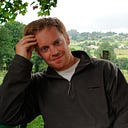Henri Nouwen on waiting as a spiritual practice
I’m in a waiting phase. Literally — I am waiting in one country to be allowed to enter another. Creatively also — I am waiting to see what happens to a project I have been working on for many years, which has hit a bump and needs to develop into something new. And spiritually — I am waiting for a new stage in my life to begin, and feel filled with uncertainty.
Culturally, we are also waiting, aren’t we? Waiting for this pandemic to be over. Waiting to see if something new will emerge from the wreckage of the hydro-carbon economy, waiting for rebirth.
Sometimes books come into our life at propitious moments. I’ve been researching discernment, and downloaded a book on that topic by a Dutch pastor and theologian, Henri Nouwen, who I’ve just noticed died on this day 25 years ago — September 21 1996.
I had been recommended Nouwen’s work a decade ago by my friend Vanessa Chamberlin, the artist and theologian, but never read him until now. I like him. I like his openness, his candid admission of his own flaws and neediness, his confusion and groping. He once wrote a book called The Wounded Healer, and he reflected:
I have been increasingly aware that true healing mostly takes place through the sharing of weakness…In the sharing of my weakness with others, the real depths of my human brokenness and weakness and sinfulness started to reveal itself to me, not as a source of despair but as a source of hope.
Nouwen wrote a book on the art of discerning the voice of God. How do we know what God wants from us? How do we know what we are called to do in our life, and when?
He says we can discern God’s voice to us through the people who come into our lives at certain moments, or through observing nature, or through books that cross our path, or through our own experiences, or through patient prayer and listening for the voice of God.
And he talks a lot about waiting. He writes:
I have found it very important in my own life to try to let go of my wishes and instead to live in hope. I am finding that when I choose to let go of my sometimes petty and superficial wishes and trust that my life is precious and meaningful in the eyes of God, something really new, something beyond my own expectations begins to happen in me.
To wait with openness and trust is an enormously radical attitude toward life. It is choosing to hope that something is happening for us that is far beyond our own imaginings. It is giving up control over our future and letting God define our life. It is living with the conviction that God molds us in love, holds us in tenderness, and moves us away from the sources of our fear.
Our spiritual life is a life in which we wait, actively present to the moment, expecting that new things will happen to us, new things that are far beyond our own imagination or prediction. This, indeed, is a very radical stance toward life in a world preoccupied with control.
In his book on discernment, he writes:
Active waiting is essential to the spiritual life. In our mostly active lives and fast-paced culture, waiting is not a popular past-time. It is not something we anticipate or experience with great joy. In fact, most of us consider it a waste of time….
We wait with patience. The word patience comes from the Latin verb ‘patior’, which means ‘to suffer’. Waiting patiently is suffering through the present moment, tasting it to the fullest in the belief that something hidden there will manifest itself to us.
When we know that we are God’s beloved and we are free to live in the house of love, all patience is co-patience — suffering with the suffering God, thus suffering and compassion give birth to new life. Active waiting is being open to the promise yet to be fulfilled. Patient waiting is staying in the present moment. Expectant waiting is trusting that this long process will bear fruit. Simone Weil writes: ‘Waiting patiently in expectation is the foundation of the spiritual life.’
It is a very counter-intuitive virtue, patient waiting, for New Age spirituality, which likes the idea of instant effects, instant manifestation, instant enlightenment. But right now, I need to learn to sit patiently, and wait in hope.
This is Nouwen’s book on discernment, and this is a famous book he wrote on the prodigal son. And here is an interesting article on his life.
